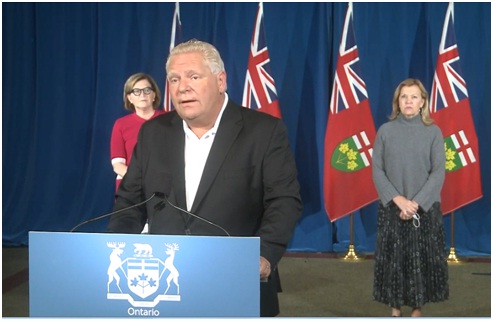Ontario Investing More Than $1 Billion to Expand COVID-19 Testing and Contact Tracing
Province Also Enhancing Efforts to Quickly Identify, Manage and Prevent COVID-19 Outbreaks
The Voice of Canada News:
TORONTO — The Ontario government is building on the largest provincial testing initiative in Canada by providing $1.07 billion to expand COVID-19 testing and case and contact management. The government is also immediately investing $30 million to prevent and manage outbreaks in priority sectors, including the province’s long-term care homes, retirement homes and schools. These investments are part of the province’s comprehensive plan to prepare the health system for the second wave of COVID-19.
Details were provided today by Premier Doug Ford, Christine Elliott, Deputy Premier and Minister of Health, and Dr. Barbara Yaffe, Associate Chief Medical Officer of Health.
“We’ve put over $1 billion on the table to help track, trace and isolate cases of COVID-19 through the largest and most robust pandemic testing initiative in the country,” said Premier Ford. “By ramping up our daily testing capacity to 50,000 tests and closely monitoring our long-term care homes and schools, we can quickly respond to any outbreaks and surges and stop the spread of this deadly virus in its tracks.”
Expanding testing and case and contact management
A critical part of Ontario’s COVID-19 fall preparedness plan is encouraging people to continue to adhere to foundational public health measures and monitor public health trends carefully. That’s why the province is investing $1.07 billion to enhance and expand efforts to test, trace and isolate new cases of COVID-19.
“As part of our plan to ensure the health system’s readiness for future waves of COVID-19, our government is dramatically expanding our testing capacity, launching more testing locations and adding more case and contact management resources to trace and isolate new cases,” said Minister Elliott. “In doing so, we will also support long-term care homes, schools and hospitals to effectively prevent, track and contain outbreaks of COVID-19.”
To date, Ontario has maintained adherence to public health measures and established a strong foundation for testing and case and contact management by:
- Establishing a provincial COVID-19 lab network with capacity for more than 40,000 daily tests;
- Establishing over 150 assessment centres;
- Testing long-term care home residents and staff in addition to the ongoing testing of staff and homes in outbreak;
- Providing up to 1,700 more contact tracers to support public health units in contact follow-ups through an agreement with the federal government;
- Launching a new, custom-built case and contact management digital system to improve data quality and timeliness and eliminate the use of the multiple tools being used across the province and the integrated Public Health Information System (iPHIS) for COVID-19;
- Launching COVID Alert, the country’s made-in-Ontario exposure notification app; and
- Launching a robust public awareness campaign to educate the public on how to keep them and their families safe, including targeted campaigns to young Ontarians.
Building on these efforts, Ontario will strengthen public health measures and continue to expand testing and case and contact management through the following:
More Testing Locations: Working with Ontario Health, local public health units and hospitals, Ontario will expand testing locations based on local needs to provide Ontarians with more access to testing and reduce testing wait times. This will include adding more testing locations such as primary care offices, at-home testing for certain home and community care clients, and starting on Friday, September 25, 2020, in participating pharmacies.
More Testing Options: Ontario will ensure health professionals can provide more people with timely and convenient tests by expanding the methods for COVID-19 testing. Less invasive collection methods, such as throat, nasal swabbing and saliva collection will now be used in addition to nasopharyngeal swabs to test for COVID-19. Starting this week, three Ontario hospitals are offering saliva collection, with more assessment centres offering this option in the coming weeks. The province continues to review innovative technologies, such as rapid and point of care tests, to ensure Ontarians have access to leading and faster testing options.
More Testing Capacity: Ontario will continue to expand the capacity of the provincial lab network so more tests can be processed and testing targets can be achieved. This includes hiring more lab staff and professional staff and improving data quality through digitizing requisition forms and other automated features. As a first step, the province will increase testing capacity to conduct up to 50,000 daily tests.
More Case and Contact Managers: Ontario will continue to add case and contact management staff to prevent the spread of the virus. There are currently more than 2,750 case and contact management staff active across all public health units tracing and managing COVID-19 cases, up from approximately 1,500 staff in the spring. An additional 500 Statistics Canada employees are being onboarded this month to assist with contact management and Ontario is hiring an additional 500 contact tracers. In total, there will be more than 3,750 case and contact management staff working to keep Ontarians safe.
Better Health Behaviour Information: Ontario will conduct health behaviour surveillance to track adherence to public health measures across Ontario and to help understand how to better communicate the importance and benefit of continuing to follow public health measures.
To measure success in these efforts, Ontario will track progress against the following:
- Faster turnaround time for testing: 80 per cent of test results delivered within 48 hours.
- Maintain test positivity rate under three per cent;
- Ensure sufficient case management and contact tracing capacity to continue reaching 90 per cent of cases within 24 hours; and
- Compliance with public health measures (based on health behaviour surveillance data).
- In support of these efforts, the province has also released new testing guidance to help focus public resources on where they are needed the most.
Quickly Identify, Manage and Prevent Outbreaks
With the flu and cold season approaching and a potential second wave of COVID-19, Ontario will invest $30 million to build on its efforts to rapidly identify and contain any COVID-19 outbreaks.
To date, Ontario has worked to improve outbreak prevention and management by:
- Deploying hospital infection prevention and control (IPAC) resources to provide ongoing support to long-term care homes;
- Naming Dr. Dirk Huyer as Coordinator of Provincial Outbreak Response to work collaboratively with all ministries, the Chief Medical Officer of Health and public health units to prevent, minimize and manage outbreaks, including in schools, long-term care homes, retirement homes, child care centres, farms and hospitals;
- Developing a COVID-19 surveillance strategy to monitor the disease and detect cases and outbreaks in a timely manner, including in long-term care homes and schools; and
- Launching a new, custom-built case and contact management digital system for rapid identification of cases to speed up outbreak management response times.
Ontario will continue to improve outbreak management through the following:
More than $510 million provided through the Social Services Relief Fund to municipal Service Managers and Indigenous Program Administrators to protect vulnerable populations, including supporting physical distancing and enhanced infection control measures in congregate settings and isolation facilities;
- Emergency Management Ontario has developed and distributed an outbreak guidance toolkit to support each ministry’s outbreak management planning, ensuring strong sector responses; and
- Stress-testing outbreak response protocols and structures through virtual simulation exercises that have been held across the province to address outbreaks in schools, universities and correctional facilities. Additional scenario planning exercises are focusing on Indigenous communities, long-term care homes and retirement homes.
As Ontario works to contain and prevent outbreaks, the province will measure success using the following criteria:
- Rapid containment of outbreaks; and
- Fewer outbreaks in congregate and other high-risk settings, including long-term care homes.
- The province’s COVID-19 fall preparedness plan, Keeping Ontarians Safe: Preparing for Future Waves of COVID-19, will help the province quickly identify, prevent and respond to any scenario in order to protect communities.
The Keeping Ontarians Safe plan will:
- Maintain strong public health measures, including continued expansion of testing and case and contact management;
- Quickly identify, manage and prevent COVID-19 outbreaks;
- Accelerate efforts to reduce health service backlogs;
- Prepare for surges in COVID-19 cases;
- Recruit, retain, train and support health care workers, while also continuing to engage families and caregivers; and
- Implement the largest flu immunization campaign in Ontario’s history.
- QUICK FACTS
- The best way to combat COVID-19 is to continue to follow strong public health advice that reduces the risk of transmission and help keep Ontarians safe.
- With a current capacity of more than 40,000 daily tests, Ontario has been processing an average of 39,500 tests per day over the past seven days and is working on building testing surge capacity.
- Testing is available at any of the province’s 151 assessment centres currently open and at participating pharmacies starting Friday, September 25. To find the closest assessment centre or pharmacy, please visit Ontario.ca/covidtest.
- Since the launch of the Case and Contact Management Strategy, Ontario continues to consistently reach more than 90% of new cases within 24 hours of a case receiving a positive test result.










